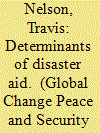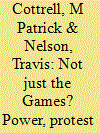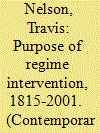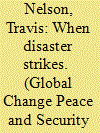|
|
|
Sort Order |
|
|
|
Items / Page
|
|
|
|
|
|
|
| Srl | Item |
| 1 |
ID:
109875


|
|
|
|
|
| Publication |
2012.
|
| Summary/Abstract |
This article examines the motivations behind the provision of disaster aid. Is this aid provision driven more by 'humanitarian' variables such as the severity of the political or natural emergency in the recipient state or 'political' variables such as the economic or strategic interest of the donor state? Through a statistical analysis of the aid activity of 22 donor states between 1997 and 2008, it is found that, contrary to much of the literature on humanitarian aid in general, humanitarian variables are consistently significant predictors of disaster aid provision. However, certain political variables are also significant, in that donor states provide more disaster aid to trading partners, former colonies, and military allies.
|
|
|
|
|
|
|
|
|
|
|
|
|
|
|
|
| 2 |
ID:
110785


|
|
|
|
|
| Publication |
2011.
|
| Summary/Abstract |
This article conducts a theoretical and empirical analysis of political protest activity surrounding the modern Olympic Games. Although the Olympics are certainly among the world's most prominent and recognized events, they have seldom been explored from a political perspective within the mainstream International Relations and transnational protest literatures. We argue, however, that the Olympics provide a theoretically interesting context in which to examine political contention in International Relations in large part because they provide such a unique opportunity structure for a range of actors to exercise power in pursuit of their goals. The article presents an original dataset of all protest occurring between 1896 and 2008 and uses these data to show that not only has Olympic political contention grown substantially over time, but it also has evolved in interesting ways in terms of the particular actors engaged in contention, the tactics they use, and the resistance they face. Furthermore, we suggest that the study of the Olympics has important implications for understanding the power and power limitations of those actors (including transnational advocacy networks, international institutions, and sovereign states) participating in Olympic protest.
|
|
|
|
|
|
|
|
|
|
|
|
|
|
|
|
| 3 |
ID:
080316


|
|
|
|
|
| Publication |
2007.
|
| Summary/Abstract |
This article is an examination of an understudied yet clearly significant international
phenomenon: military intervention explicitly directed at regime change in a target
state. The article argues that regime interventions are best understood not dyadically,
but regionally. They are primarily attempts to stabilize regional interests of
the intervening state. This hypothesis is tested through statistical analysis of
intervention between 1815 and 2001. The statistical results indicate that regime
interventions are marked by a strong connection between the intervening state
and the target region and by direct instability within that region prior to the
intervention.
This finding calls into question the dyadic assumptions of much empirical work
on international conflict; regional perspectives need to figure more prominently.
This suggests, for example, that the 2003 invasion of Iraq is less about Saddam
Hussein or direct access to Iraqi oil, but a signal of American commitment to
the broader Middle East. This intervention, like most other regime interventions,
is regionally motivated, not dyadic. Regime interventions occur when a region is
undergoing instability and an intervening state believes it must signal commitment
to regional stability. While interventions in Iraq and Afghanistan make
sense within this context, similar actions in North Korea and Iran seem much
less likely.
|
|
|
|
|
|
|
|
|
|
|
|
|
|
|
|
| 4 |
ID:
096681


|
|
|
|
|
| Publication |
2010.
|
| Summary/Abstract |
This article asks under what circumstances natural disaster can lead to interstate conflict initiation. Through an analysis of all major earthquakes, floods, storms, and tsunamis between 1950 and 2006, I find that serious disaster increases the general likelihood of conflict initiation, and I reach two key conclusions about the specific causal mechanisms driving post-disaster conflict. First, I show that there is not a single instance of a rival or opponent state taking the opportunity to initiate military conflict in the aftermath of serious disaster. This finding supports the developing literature on 'disaster diplomacy'. Second, there are, however, cases in which states with a recent history of significant civil disruption initiate such conflicts themselves. In these situations, disaster can contribute to the conflict environment and can make conflict initiation significantly more likely. I find that, counter-intuitively, it is the very states most vulnerable and most weakened by disaster that are likely to initiate conflict in a post-disaster environment.
|
|
|
|
|
|
|
|
|
|
|
|
|
|
|
|
|
|
|
|
|